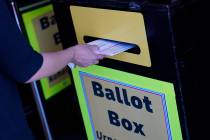LETTERS: Less affluent shortchanged by solar power
To the editor:
The annual convention of the NAACP, happening this week in Las Vegas, could not be a better forum for the African-American community to gather and discuss how to tackle new challenges. Chief among these is the question of how communities of color can best get involved in the clean energy revolution, in a way that does not hinder economic opportunity. Right now, the race to a cleaner energy future is playing out like a bad game of dodgeball, with communities of color on the losing side.
This is primarily due to an old rule called net metering, which allows rooftop solar owners to skirt the costs of paying for the electricity grid. Nine times out of 10, these homeowners are wealthier individuals — the only ones who can afford to put a high-priced rooftop solar system on their home.
Rooftop solar panels can’t go on top of community housing or apartments. So the poor and less affluent are hit with the cost of paying for the grid and solar systems for homeowners. And these are considerable added costs to electricity bills — in California, it’s been documented that costs passed along to consumers through net metering amount to a staggering $1.1 billion.
Net metering is also helping the rich get richer. It’s all Wall Street and Silicon Valley types — already millionaires and billionaires — who are behind these rooftop solar companies and are taking advantage of net metering to market their product to customers.
Communities of color, which are already facing a number of economic and societal challenges, should not have to shoulder the expenses of wealthy rooftop solar owners. Public policies that serve as a barrier to entry for African-Americans to take advantage of these clean energy sources — and go so far as to hurt our communities — must be changed.
It’s encouraging that regulators are waking up to what’s been happening and that policy changes are being made. But we need this to happen across the country to ensure equal access and social justice when it comes to green energy. It’s the only way that all communities, regardless of race, color or income, can win in the green energy game.
LEWIS JENNINGS
PENSACOLA, FLA.
The writer is a Florida state conference area director for the NAACP.
Energy monopoly
To the editor:
For some time, I have been reading letters to the Review-Journal regarding NV Energy and solar customers. I installed a solar panel on my house last year, at great expense, but it was money well spent. My electric bill is $11 per month.
Now, NV Energy wants to mess with anyone who installed solar panels. The company wants to increase the net metering fee and reset other fees. I filed a complaint with the Public Utilities Commission and got a letter back that my complaint would be kept on file for three years. So don’t bother to file a complaint; the PUC never reads them.
I also received a call from NV Energy about a new savings program. All I needed to qualify was to have a monthly electric bill of at least $90. I told the representative that my bill was $11, so I did not get an explanation of the new program.
Those of us who have solar systems do not use all the energy we produce, so we give it to NV Energy for free. The utility has no cost-of-production or maintenance. Then NV Energy sells that energy to the public at full price — that’s 100 percent profit. I have no problem with that, as long as NV Energy leaves everything as it is. But as usual, the company wants more.
So how do we, the solar producers who give NV Energy free power, charge for what we give to NV Energy? We can’t. We do not have a commission. It boils down to whether or not the PUC is going to do its job and keep NV Energy in check, which I bet the commission will not.
A few days after NV Energy called me, I got a notice that the power company filed for another rate increase; this time, the total revenue from the increase would amount to nearly $21 million. You can go to the PUC and file a complaint, which the commission will file for three years, or you can go in person and give your thoughts, but you must not talk more than two minutes. Does that sound like the fix is in? You bet. This is what happens when you have a single source of supply. It’s called a monopoly.
GERRY MCNULTY
NORTH LAS VEGAS
Contraception complainers
To the editor:
I was amazed to see another example of bitter complaining about a subject the complainer seemed to know little about, in this case Scott Kagan (“U.S. needn’t babysit parents, just women,” July 15 Review-Journal letters). Mr. Kagan is completely wrong with his implication that “old white men” have put women back in the dark ages because they have been denied their right for contraception under the free-for-all of Obamacare.
The Supreme Court decision in favor of Hobby Lobby put only four forms of birth control on the list that Hobby Lobby did not have to pay for; the other 16 are still quite available. And “old white men” also handed down the Roe v. Wade decision four decades ago. How about that?
SHIRLEY CODDINGTON
LAS VEGAS






























